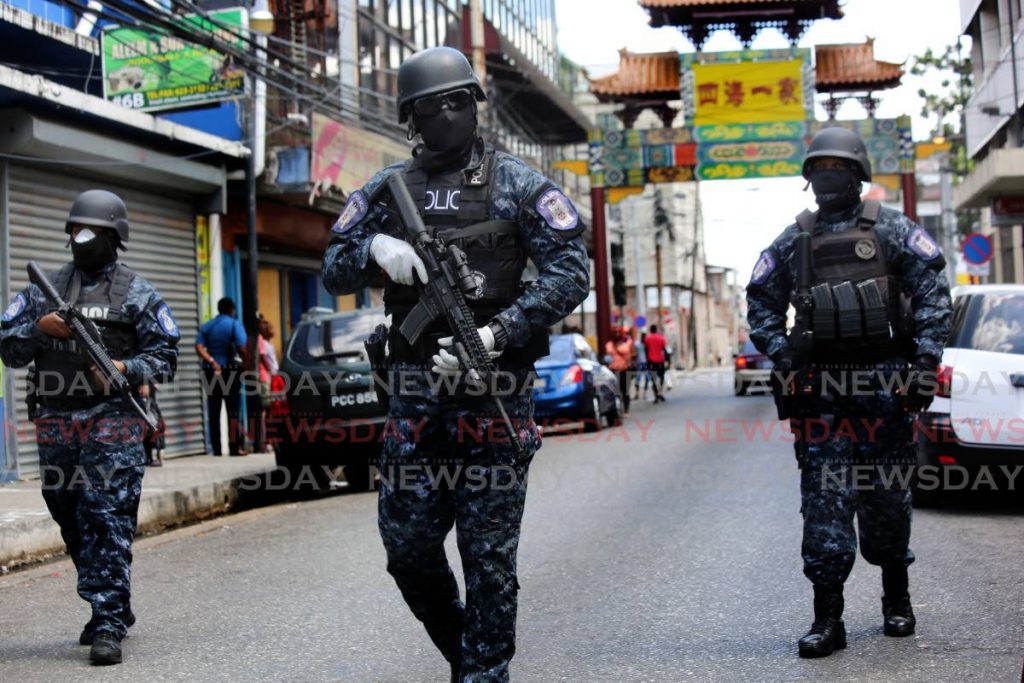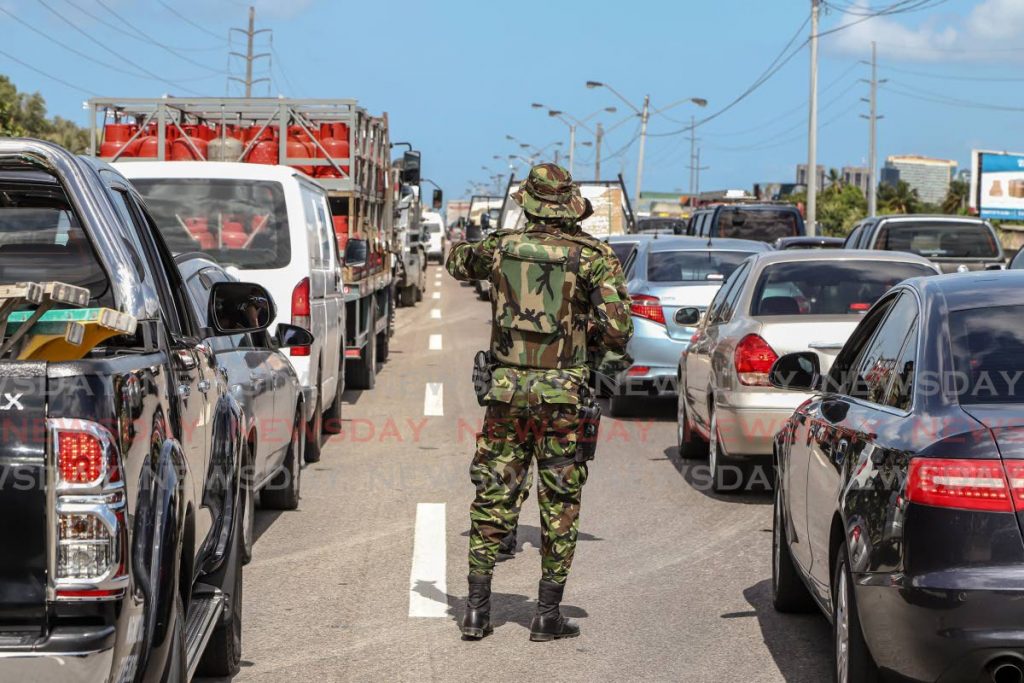Police corruption deepens, 35 years after Scott Drug Report

Trinidad and Tobago was assailed by the damning evidence of police involvement in drug trafficking, US counterfeit rings, murder, prostitution and a host of serious crimes, almost 35 years ago.
Back then, the man who sat in the commissioner's chair, the Kojak-style Randolph Burroughs, was identified as the mastermind behind a criminal enterprise which unleashed the scourge of cocaine from Colombian cartels on the streets and safe trafficking routes for marijuana growers.
Witnesses, including police who testified in secret before the commission of enquiry established in April 1984, claimed Burroughs, together with a band of untouchables, aptly named the Flying Squad, were linked to drug barons Dole Chadee, Naim Naya Ali, Chaitran Gayah, Adella Moses, Teddy "Mice" Khan, Hosein "Betalal" Alladin and other violent drug traffickers, as well as corrupt judicial officers.
They were protected by the CoP and rivals were silenced as cocaine crept its way through the corridor of power and even the nostrils of government ministers.
All of them are now dead, some were murdered, executed by the State, and missing at sea but the stains of corruption in the police service remained and seems to have infiltrated the ranks of the defence force.
While Burroughs demitted office in disgrace after being charged with conspiracy to murder, most of the officers who were identified in the Scott Drug Report served out their time and some were promoted to executive ranks.
In its conclusion, the report stated, "The evidence has disclosed that is it common knowledge that corruption and indiscipline are widespread within the organisation resulting in its very poor public image. It cannot be overstated that leadership without integrity must result in futility."
While there have been significant advances in training, technology and selection of candidates over the last three-and-a-half decades, officers who threaten to destroy the image of the organisation have grown wiser to conceal their misdeeds.
PM defers questions on police corruption
Today, a network of corrupt officers span from executive officers of the police service and defence force with a new weapon which the Prime Minister has described as a "cancer which if left unchecked can eat the soul of the nation."
Dr Rowley, as head of the National Security Council, is briefed regularly on threats or potential threats in the country.
Speaking on Saturday at a media briefing to give an update on new measures in place to prevent the spread of covid19, he responded to questions about the matters which were unearthed in the Scott Drug Report, which still exist or have become worse, and whether he was confident that under the current leadership of the police service, rogue elements can be removed and prosecuted.

"That's a question for another time. I don't really want to get into that today. The Scott Drug Report is not really in front of us. What is in front of us is the current state of affairs of our police service that is committed to protecting and serving. What we try to ensure (is) that it sticks to that purpose."
Days after the September 21 bust in La Horquetta where $22 million in cash was seized, and subsequently returned, the Prime Minister summoned an urgent meeting of the national security advisers.
There, he was briefed on the scale of corrupt elements in the police and defence force involved in operation.
To date, police are unaware where the $22 million is concealed and there has been a wall of silence from Chief of Defence Staff Air Commodore Daryl Daniel even though leaked intelligence reports identified senior officers under his command as key architects in the scheme.
The operation has been described by top security advisers as a "national security crisis" – millions of dollars from criminal gangs earned through drug trafficking, illegal quarries, prostitution, gun deals, human trafficking, fraud have been invested in a pyramid scheme promising to churn out returns, such as $28,000 for a $3,500 investment in just three weeks.
Police investigating the Drugs Sou-Sou (DSS) have confirmed that money from illegal sources has been mixed with investments from desperate people, many of whom have been laid off during the first nine months of the covid19 pandemic.
Even in the face of an announcement that foreign investigators of Barbados and the United Kingdom have been called in to help local investigators, the operators of DSS expanded its operation in Tobago but was forced to eventually close up shop when police raided and seized numerous records and another $6.4 million in cash in late October.
Police Commissioner Gary Griffith, who has taken the lead on the investigation, has cited Trojan horses in the service working to undermine and frustrate the probe.
He has suspended four of the officers who were directly linked to returning the money and transferred 11 others, and appointed the foreign officers as special reserve police to aid a select team from the Professional Standards Bureau, Financial Investigations Bureau, and other elite arms of the service to root out the corrupt cops.
Intelligence reports and wire taps have linked senior officers to the scheme and the source of funds to criminal gangs.
Griffith, since coming into office in August 2018, has pledged to clean up the police service but the network of the pyramid scheme seems to be his toughest fight yet.
Numerous recommendations for reform, few implemented
Since its inception, the police service has been the subject of numerous reviews including the Lee Committee in 1958; the Darby Commission in 1964, the Carr Committee in 1971; the Bruce Committee in 1978; the US-sponsored Police Executive Research Forum in 1990 and the O'Dowd Committee in 1990.
A perusal of these reports show that significant recommendations were made to reform the police service, at great cost to taxpayers, but the majority of recommendations were ignored.
"It is worth emphasising that the change process is always difficult, it requires good management, a high level of commitment, ownership, planned implementation within agreed time-scales, adequate financial provision in critical areas, training and built in evaluation programmes. With a few minor exceptions, there seems to have been a failure to address these issues, together with a lack of sufficient financial resources in support of the police service over a long period of time," the O'Dowd committee observed in its report.
On the vexing issue of corruption, the O'Dowd committee referred to the findings of the Scott Drug Report.
"Corruption within police forces is not a new phenomenon and in some forces extraordinary measures have been adopted to combat the problem," the committee noted.
Later in the report, the committee suggested: "Supervisors should be particularly suspicious of subordinates who are apparently living beyond their means. Where officers are serving in departments where their duties make them extremely vulnerable, for example, vice of drugs, then clear policy guidelines and procedure must exist and supervision be maintained at a high level."
It added that the cooperation of the public is a vital factor in dealing with corruption and people should be encouraged to make reports against errant officers and be afforded the confidentiality in doing so.
"Safeguards should be in-built to avoid frivolous and vindictive complaints against honest police officers and false and malicious allegations should be made subject of criminal proceedings," the committee suggested to avoid abuse of the process.
But it noted that the "ultimate in dealing with offences of corruption should be criminal proceedings wherever possible. In circumstances where criminal charges cannot be brought but wrongdoing can be shown use should be made of the disciplinary code with exemplary punishments being used as a deterrent."


Comments
"Police corruption deepens, 35 years after Scott Drug Report"